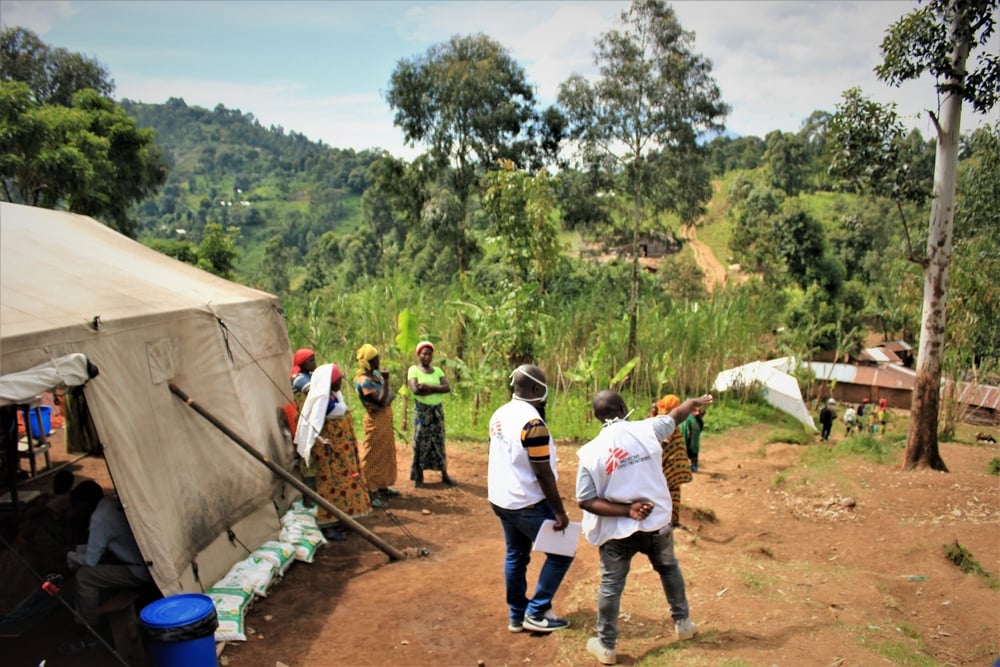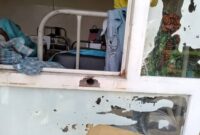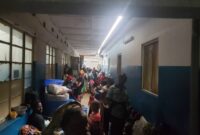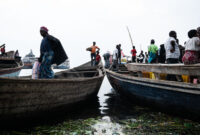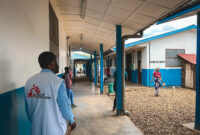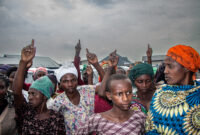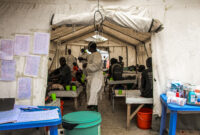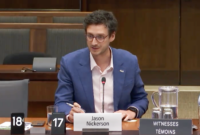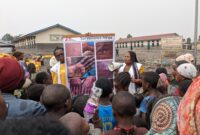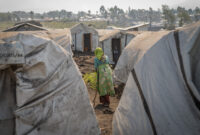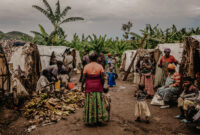DRC: MSF calls for increased response to major crisis in North Kivu
A humanitarian disaster is underway in North Kivu, in the east of Democratic Republic of Congo (DRC), where around one million people have fled their homes in the past 12 months to escape fighting linked to the resurgence of the M23 armed group. This major crisis is exacerbating an already critical humanitarian situation in the province.
Displaced people, as well as people living in remote communities cut off by the fighting, are exposed to numerous health risks, says Doctors Without Borders/Médecins Sans Frontières (MSF), whose teams work in the area. Denouncing the current humanitarian response as vastly inadequate, MSF is calling on the international community and the authorities to urgently scale up their efforts to meet people’s needs.
“The situation in North Kivu is alarming,” says Raphaël Piret, MSF’s country representative in DRC. “You only have to look at the appalling conditions in which people are living on the outskirts of the provincial capital, Goma, to realize that the response is not up to the needs, despite the fact that there are many humanitarian organizations working in eastern DRC.”

Poor living conditions
Over the past few months alone, hundreds of thousands of people have fled their homes and villages to live with host families or in informal sites. Around Goma, makeshift shelters made of plastic sheets or mosquito nets stretch as far as the eye can see, while other people have found shelter in churches and schools.
“We arrived here in June last year and settled in a disused church in Kanyaruchinya with about 150 other families,” says 65 year old Celestine. “For the past eight months, our daily life has been a series of difficulties – in sleeping, eating and clothing ourselves. Only one food distribution has taken place since the beginning of the year and, as my name was not on the list, I didn’t receive anything. We make do as best we can with what we find in the surrounding fields.”
Around 3,000 shelters, currently accommodating some 15,000 people, have been built in the past year on the outskirts of Goma, but these numbers are small compared to the scale of people’s needs.
“This is a drop in the ocean compared to the hundreds of thousands of displaced people who are currently camping out around the city’s gates,” says Abdou Musengetsi, MSF project coordinator in Goma. “Families have been at the mercy of rains, epidemics and violence for months, as shown by the worrying number of victims of sexual violence that we treat every day in our medical facilities.”
MSF teams have been working in informal displacement sites around Goma since May 2022, providing free medical care, trucking in supplies of drinking water, and constructing latrines and showers.
However, much remains to be done. In Bulengo, an informal settlement 10 km west of Goma, there is just one latrine for almost 500 people – less than one-tenth of what is required to meet basic humanitarian emergency standards. In the neighbouring settlement of Lushagala, displaced people are surviving on just over one litre of clean water per day, well below the recommended 15 litres of water per day.
Inadequate and overcrowded shelters and a lack of clean water and latrines create ideal conditions for diseases to spread. In recent months, measles and cholera broke out in sites north of Goma, in Nyiragongo territory, while the health situation has now become critical in Bulengo and Lushagala, with cases of suspected measles and cholera multiplying over the past few weeks.
“In March, in Bulengo alone, we treated almost 2,500 patients with cholera symptoms and over 130 children with measles,” says Musengetsi.
“It’s a shocking situation,” says Piret. ”Our teams are working around the clock to fight cholera and deal with the growing cases of measles, but they are completely overwhelmed. Faced with the humanitarian and health disaster unfolding before our eyes, stepping up assistance to the displaced people – both in Goma and elsewhere – is a matter of urgency.”
Today, an estimated 2.5 million people are displaced throughout North Kivu province, according to the UN. As the fighting continues, yet more people may be forced from their homes and require aid to survive.
“All those involved in the humanitarian response must be more reactive and more flexible in order to respond quickly to people’s needs and adjust to changing population movements,” says Piret.
Restricted access to healthcare
North of Goma, MSF teams are also seeing the consequences of the crisis in Masisi, Rutshuru and Lubero territories. As the frontlines of the fighting have shifted, most of the major routes into the region have been cut off. Transport links into this agricultural region, known as “the granaries of the province”, are essential for trade in North Kivu. Cut off from the rest of the province, inhabitants have been unable to sell their crops or to buy all but a few essential products, which have doubled in price.
Many medical facilities have run out of drugs due to supply problems; in Rutshuru territory, for instance, some health centres have not received any medicines for months. In these territories, accessing healthcare was already difficult but is now even more challenging due to the lack of functioning health facilities and to the cost of medical care, which is unaffordable for many in the current economic crisis.

“Due to a lack of financial means, the majority of the population simply no longer have access to healthcare,” says Monique Doux, MSF project coordinator in Rutshuru. “They have to make a choice between eating or getting medical treatment. Even those who can afford to pay for treatment still have to find a functional health facility, which can take several hours of walking.”
With prices rising and access to healthcare deteriorating, food insecurity is worsening in the province. More than one-third of North Kivu’s population – three million people – are currently at risk of food insecurity, according to the UN.
“In the health centres that we support in Rutshuru territory, we treated more than 8,500 malnourished children in 2022, which is almost 70 per cent more than in 2021,” says Doux.
In Rutshuru territory, as in Lubero and Masisi, there is a glaring lack of organizations providing much-needed aid. “It feels as if people here have been abandoned,” says Doux. “For months, MSF has been the only humanitarian organization working in Rutshuru territory, but the needs of the inhabitants far exceed our capacity to respond.”
“There is no time to lose,” says Piret. “The aid community and the authorities must redouble their efforts to ensure that humanitarian aid reaches the people who need it, wherever they are, while all parties to the conflict must commit to facilitating access for humanitarian organizations.”
MSF’s emergency response
MSF launched an emergency response to provide medical care to displaced people in Rutshuru territory in April 2022. After the first influx of displaced people arrived in Goma in May 2022, MSF emergency teams provided medical care, set up water supplies and improved hygiene conditions in informal displacement sites, first in Munigi and Kanyaruchinya, and more recently in Bulengo and Lushagala. In February 2023, MSF teams provided medical care and humanitarian aid to some 30,000 temporarily displaced people in the city of Mweso. MSF teams are currently strengthening their response to displaced people in Kayna, Lubero territory, and in Minova (South Kivu).
Meanwhile, MSF medical teams are maintaining their regular activities in Goma, Rutshuru, Kibirizi, Bambo, Binza, Mweso, Masisi and Walikale, providing essential medical care to thousands of people across North Kivu province.
